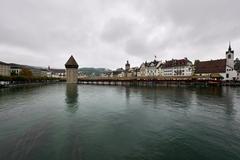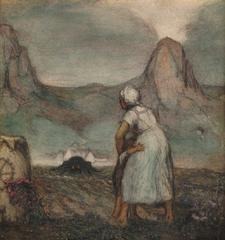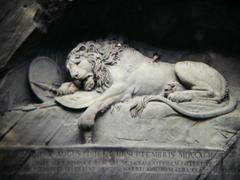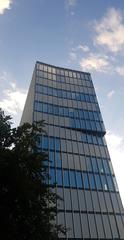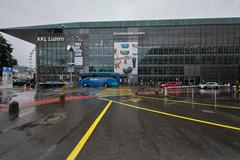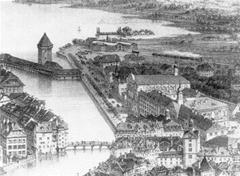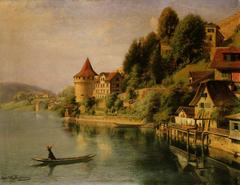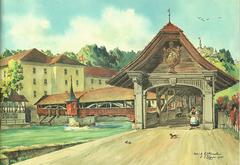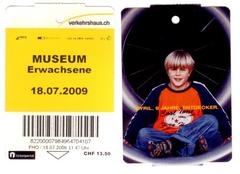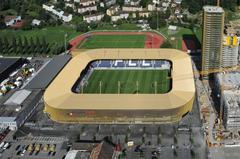
Staatsarchiv Luzern: Visiting Hours, Tickets, and Travel Guide
Publication Date: 04/07/2025
Introduction
The Staatsarchiv Luzern, located in the vibrant heart of Lucerne, Switzerland, is a cornerstone of the region’s historical and cultural preservation. As the official state archive of the Canton of Lucerne, this institution safeguards over seven centuries of documentary heritage, ranging from medieval charters and maps to private family papers and ecclesiastical records. More than merely a repository, the Staatsarchiv Luzern is an active center for genealogical research, legal transparency, and public education, welcoming everyone from scholars and students to curious travelers.
Since 1993, the archive has been housed in a modern, purpose-built facility designed for both optimal preservation and visitor accessibility. With free admission, guided tours, digital resources, and a central location close to Lucerne’s Old Town and major landmarks, the Staatsarchiv Luzern is an essential stop for anyone interested in Swiss history or culture.
This guide provides comprehensive and up-to-date information on visiting hours, ticketing, research opportunities, accessibility, and nearby attractions. For the latest updates, visitors should consult the archive’s official website, EHRI Project profile, and Lucerne’s tourist information portal.
Contents
- Introduction
- About Staatsarchiv Luzern
- Historical and Cultural Importance
- Visitor Information
- Visiting Hours
- Admission and Tickets
- Location and Accessibility
- Facilities and Services
- Photography and Document Reproduction
- Language and Research Support
- Archival Highlights
- Guided Tours and Events
- Tips for Visitors
- Nearby Attractions
- Frequently Asked Questions (FAQ)
- Visual Highlights
- Explore More
- Contact Information
- Conclusion
- Sources
About Staatsarchiv Luzern
The Staatsarchiv Luzern (State Archive of Lucerne) is the official depository for the historical records of the canton. Its collections document Lucerne’s evolution from a medieval Benedictine settlement to a modern Swiss canton. Holdings include government archives, legal documents, parish registers, guild records, private archives, and photographic collections.
The archive has embraced modernization, continually expanding its digital and physical infrastructure to ensure both preservation and accessibility. Researchers and the public benefit from onsite reading rooms, digitized collections, and educational programs.
Historical and Cultural Importance
Custodian of Lucerne’s Documentary Heritage
The Staatsarchiv Luzern holds the statutory mandate to collect, preserve, and provide access to all archive-worthy records from both cantonal authorities and private sources (Staatsarchiv Luzern). Its holdings are systematically organized into government records, private archives, photographic collections, and specialized documentation (Fotodok Swiss).
Role in Genealogical and Historical Research
The archive is a premier resource for genealogists and historians, offering microfilms of parish registers (ca. 1600–1875) and supporting basic genealogical queries (Staatsarchiv Luzern – Familienforschung). While in-depth research must be conducted by visitors themselves, staff assist with confirmations of vital records when provided with specific information.
Legal and Administrative Significance
By preserving official documents, the Staatsarchiv Luzern ensures transparency, legal continuity, and the right to information. Legal regulations govern access to sensitive records—such as a 100-year protection period for civil status and family registers (Staatsarchiv Luzern – Familienforschung).
Contribution to Cultural Heritage
The archive is instrumental in safeguarding both tangible and intangible cultural assets of Lucerne and contributes to Switzerland’s broader heritage preservation efforts (Federal Office of Culture).
Support for Academic and Public Inquiry
Open to all, the Staatsarchiv Luzern supports research, legal inquiries, and personal history projects. Its public reference library and digital resources are accessible to both scholars and the general public (Archives Online; FamilySearch).
Preservation of Private and Community Records
The archive actively acquires records from private individuals, families, businesses, associations, and political parties, creating a comprehensive reflection of Lucerne’s social and economic evolution (Archives Online).
Architectural and Institutional Modernization
Since 1993, the archive has operated from a modern, climate-controlled facility with secure storage and visitor-friendly research spaces (Fotodok Swiss).
Engagement with the Broader Archival Community
Through collaboration with national and international archival networks, the Staatsarchiv Luzern contributes to best practices and joint preservation initiatives (Archives Online).
Educational and Outreach Activities
The archive promotes public engagement through workshops, thematic exhibitions, and online forums such as the Geneal-Forum and the Portrait Archive.
Visitor Information
Visiting Hours
- Monday to Friday: 8:30 AM – 12:00 PM and 1:30 PM – 5:00 PM
- Closed: Weekends and public holidays
Always check the official website for any updates, changes, or special closures.
Admission and Tickets
Admission is free for both exhibitions and research visits. Reading rooms and special collections may require prior appointment.
Some special events, workshops, and courses (such as genealogical research workshops) may require advance registration and a fee (Genealogie Zentralschweiz).
Location and Accessibility
- Address: Staatsarchiv Luzern, Schützenstrasse 9, 6003 Lucerne, Switzerland
- Public transport: 10-minute walk from Lucerne main train station; several bus lines stop nearby (Luzern.com)
- Parking: Limited in the city center. Public transport is highly recommended.
- Accessibility: Fully wheelchair-accessible with elevators and accessible restrooms. Contact the archive for specific needs in advance.
Facilities and Services
- Reading Rooms: Quiet research spaces with microfilm readers, computers, and reference materials.
- Lockers: Secure storage for personal items; coats and bags are not permitted in reading rooms.
- Restrooms: Accessible facilities available.
- Wi-Fi: Available for visitors.
- Visitor Registration: Required for research access; bring valid photo ID.
Photography and Document Reproduction
- Exhibitions: Photography generally allowed unless otherwise posted.
- Reading Rooms: Photography and scanning of original documents is prohibited unless explicit permission is granted.
- Reproduction: Staff can advise on digital or physical copies. Some fees may apply for reproductions.
Language and Research Support
- Most resources and staff communication are in German.
- English-language assistance is available, especially via email.
- For genealogical queries, provide as much specific information as possible to facilitate research (Staatsarchiv Luzern – Genealogical Research).
Archival Highlights
- Medieval Charters: Original documents marking Lucerne’s entry into the Swiss Confederation (1332).
- Historic Maps and City Plans: Tracing Lucerne’s urban development.
- Parish Registers: Microfilmed records (ca. 1600–1875) invaluable for genealogical research.
- Reformation and Counter-Reformation Records: Documenting significant religious shifts.
- Guild and Economic Records: Chronicles of Lucerne’s economic history.
- Private Family Archives: Personal stories reflecting Lucerne’s social fabric.
- Photographic Collections: Notable images by Franz Vogel, Mondo Annoni, and others (Fotodok Swiss).
Many highlights are available in rotating exhibitions and online through the archive’s digital portal.
Guided Tours and Events
- The archive periodically organizes guided tours, thematic exhibitions, lectures, and workshops, including popular genealogical research courses and talks on topics such as local crime history (imTicker.ch).
- Check the archive’s news page or event calendar for current offerings and registration details.
Tips for Visitors
- Plan Ahead: Contact the archive in advance for special research needs or group visits.
- Bring ID: Required for research access.
- Translation Tools: Non-German speakers may benefit from bringing translation apps.
- Combine Your Visit: The archive’s central location allows for easy inclusion in broader Lucerne sightseeing itineraries.
- Explore Digital Resources: Many records are digitized and available for remote research.
- Respect Archive Rules: Store bags in lockers, maintain a quiet atmosphere, and follow staff instructions.
Nearby Attractions
Enhance your visit by exploring Lucerne’s iconic sites, all within walking distance or a short ride from the Staatsarchiv:
- Chapel Bridge (Kapellbrücke): Famous medieval wooden bridge.
- Old Town: Historic streets, boutiques, cafés.
- Musegg Wall: Well-preserved city fortifications.
- Swiss Museum of Transport: Interactive exhibits on Swiss mobility.
- Glacier Garden, Church of St. Leodegar, Jesuit Church: Additional cultural highlights (MySwissAlps.com; Luzern.com).
Frequently Asked Questions (FAQ)
Q: What are the Staatsarchiv Luzern’s visiting hours?
A: Monday–Friday, 8:30 AM–12:00 PM & 1:30 PM–5:00 PM; closed weekends and holidays.
Q: Is there an admission fee?
A: No, entry is free. Some workshops or special events may require a registration fee.
Q: Are guided tours available?
A: Yes, offered periodically. Check the archive’s website for schedules.
Q: How do I access specific records?
A: Contact the archive in advance to reserve workspace and request materials.
Q: Is the archive accessible for visitors with disabilities?
A: Yes, full accessibility is provided.
Q: Can I take photos inside the archive?
A: Only in public exhibition areas unless otherwise indicated; not permitted in reading rooms without permission.
Q: Is English-language support available?
A: Yes, staff can assist in English, especially via email.
Visual Highlights
Alt tag: Staatsarchiv Luzern building exterior showcasing modern archival facility
- Interior reading room – “Visitors exploring Staatsarchiv Luzern reading room”
- Historical map – “Medieval map of Lucerne from Staatsarchiv Luzern collection”
Explore More
To further immerse yourself in Lucerne’s heritage, visit related sites such as the Richard Wagner Museum and the Swiss Museum of Transport. Explore our Lucerne Historical Sites and Swiss Archives Overview for broader context.
Stay connected by following Staatsarchiv Luzern on social media, subscribing to their newsletter, and using the Audiala app for digital resources and updates.
Contact Information
- Address: Staatsarchiv Luzern, Schützenstrasse 9, Postfach 3439, 6002 Luzern, Switzerland
- Phone: +41 41 228 53 64
- Website: Genealogie Zentralschweiz – Staatsarchiv Luzern
- Email: Available via the archive’s official website contact form
Conclusion
The Staatsarchiv Luzern is an indispensable destination for anyone interested in Swiss history, genealogy, or archival research. Its extensive collections, commitment to public access, and central location make it both a valuable resource and a rewarding cultural experience. Whether you wish to explore medieval documents, trace your ancestry, or simply deepen your understanding of Lucerne’s past, the Staatsarchiv Luzern welcomes you.
For current information, special events, and planning tools, consult the official Staatsarchiv Luzern website and Lucerne Tourist Information. Download the Audiala app to stay updated on related cultural content and events.
Sources and Further Reading
- Staatsarchiv Luzern, 2025, Official Website (Staatsarchiv Luzern)
- EHRI Project, 2025, European Holocaust Research Infrastructure (EHRI Project)
- Luzern.com, 2025, Lucerne Tourist Information (Luzern.com)
- Genealogie Zentralschweiz, 2025, Genealogical Research in Central Switzerland (Genealogie Zentralschweiz)
- Fotodok Swiss, 2025, Swiss Photographic Archives (Fotodok Swiss)
- Federal Office of Culture, 2025, Swiss Cultural Heritage (Federal Office of Culture)
- imTicker.ch
- MySwissAlps.com
- Aplins in the Alps
- FamilySearch
- Archives Online
- Geneal-Forum
- Portrait Archive









